The Revolution of the Trois Glorieuses: July 1830 or the Summer of the Four Kings
The Engineering Corps
The government
The Revolution of the Trois Glorieuses: July 1830 or the Summer of the Four Kings
Table of Contents
Making a long short short, Charles X was an imbeciles and the English could only force us to support the Bourbons for so long! As soon as we got an excuse, we revolted against them once again—and this time let us hope it is for good! This was the time of the Summer of the Four Kings and the days of the Trois Glorieuses.
Summary
| General Information | |
|---|---|
| Date | 27, 28, 29 July 1830 |
| Location | Paris |
| Casus belli | Ordonnances de Saint-Cloud |
| Outcomes | Victory of the insurgents
Abdication of Charles X Election as king of Lucien Esselin New war against the European coalition |
| Leaders of the belligerents | |
| Charles X
Louis de France (his son) Marshal Auguste de Marmont |
Gilbert du Motier de La Fayette
Maurice Gérard Jacques Laffitte Casimir Perier Pierre-François Audry de Puyraveau Auguste de Schonen François Mauguin Georges Mouton |
| Forces involved | |
| 8,000 insurgents | 20,000-30,000 soldiers |
| Casualities | |
| 163 dead
578 injured |
788 dead
4,500 injured |
| Battle | |
| Trois Glorieuses |
Cause
After Napoléon's death, the National Assembly had to vote in a new king. Under threats from the English, they did not choose Napoléon's infant son but instead the heir of the "legitimate" House of Bourbon, Louis XVIII. French people were, of course, furious at the interference, but because of the occupation of the country by the English army they could not do anything against it. For now, at least…
When Louis XVIII died in 1824, it was his brother Charles X who succeeded him on the throne, once again because of English interreference. Indeed, both Louis XVIII and Charles X were popular among the branch of the population who wanted to pretend that the revolution had never happened. However, this was not but by far the majority of French people.
Those Restauration kings could not re-establish the full power of the monarchy, but they made a credible attempt at it. When Charles X did not like the results of the last election of the deputies of the National Assembly, he took the ordonnances de Saint-Cloud on the 25th July 1830. With those, he stopped press freedom, dissolve the assembly and change who would be included in the voters for the new upcoming election.
Of course, French people could not allow this to pass.
Events of the revolution of the Trois Glorieuses
26th July
Those Bourbons think they can get one over us? That because those damned English carried them to the throne, they can do what they want and nobody will react? Revolution!— The average Parisian
On Monday 25th July, the ordonnances are published in the newspaper and shocked all French people. The opposition was expecting some clashes with the king, but not before the first meeting of the Assemblies on the 3rd of August. Journalists publish a protestation.
Deputies gather and talk together, but they cannot reach a decision on what to do and only agree to meet again the next. The government was reassured by how calm Paris appeared. A grave mistake.
The legal regime is interrupted, that of force has begun. In the situation in which we are placed, obedience ceases to be a duty. Today, therefore, criminal ministers have violated legality. We are exempt from obedience. We will try to publish our sheets without asking for the authorisation that is imposed on us.
Deputies gather and talk together, but they cannot reach a decision on what to do and only agree to meet again the next. The government was reassured by how calm Paris appeared. A grave mistake.
27th July
On the 27th of July, the newspaper published the journalists' protests without autorisation. Police immediately seized the printing presses of those newspapers and asked for the arrestations of the journalists responsible. The Marshal Marmont, a traitor who betrayed Napoléon in 1814, was then put at the head of the army in Paris. He had 11,500 soldiers under his command. The deputy once again met and cannot come to a decision, unwilling to trigger a definitive rupture with Charles X and a potential new revolution.All those politicians were completely useless! All ready to make compromise with the devil just to ensure their own safety!
At 5pm, the first clashes started between Parisian crowds and the soldiers who were in position around the palace of the Tuileries and the nearby place du Palais-Royal. The soldiers fired their magic into the crowd and made the first victims. Barricades immediately appeared throughout Paris.
The troops took position on major places with their canons. Weapons started to appear in the crowd, and shops selling them were looted. But still, the different clashes between the two side were limited and little magic was used.
28th July
In the morning of the 28th, groups of students, including Polytechnique students, workers and members of the National Guard walk along the street shouting "Down with the ministers! Down with the Bourbons", while people built new barricades in the poorer neighbourhood which have lost of narrow streets. Some of the leaders are the students, national guards, important figures of the Republican movements—members of the secret society of the Charbonnerie—or veterans from Napoléon's army. Yet most of those would-be revolutionaries are acting spontaneously out of anger at the hated Bourbons. They are estimated to not have been beyond 8,000 insurgents, but the whole population of Paris is on their side, bombarding the soldiers from their windows.And once again, Polytechnique students coming to the rescue of Paris! What? Of course I was among them all, even though I had not had the occasion to attempt the entrance exams yet, I was still ideally located in Paris at the time, and no one sane would have missed such events!
From the start of the morning, they conquered the Hôtel de ville and Notre-Dame and put tricolour flags at their top, a very potent symbol for everyone in the city. The Marshal sent a message to the king, but Charles X refused to make any concession. More troops are called from everywhere in France to come reinforce the army in Paris.
Fierce fighting occurred all day. Despite their superior numbers and weapons, the soldiers have to continuously draw back. They formed nice compact target in the street hile the insurgents were all hidden behind their barricades and inside buildings.
Whether the soldiers are hit by a cobble stone or an alchemical potions makes little difference, both are as deadly in the hand of an angry crowd.
Meanwhile, the deputy met again, and even sent a representative to meet the king for two hours with little results. They then met Marshal Marmont who had been pushed back into the Tuileries Palace, but he refused to withdraw his troops so long as the "riot" was ongoing. Still, the Marshal sent yet another message to the king, who still refused to change his mind.
The first message were sent to Louis Philippe d'Orléans, cousin of the king and an important liberal figure. The king had put him under close watch by the army, but he had managed to slip away from their grasp. Still, Louis-Philippe refused to compromise himself and stayed away from Paris.
And again, with all the useless negotiations! Completely incapable of getting anything done those people are! What they need is a strong leader, and how lucky we are to have King Lucien devoting himself to leading the sheep!
29th July
The insurgents awakened highly motivated by the events of the previous day, and the Polytechnique students lead the crowd in new attacks against the soldiers. Marshal Marmont was awaiting what he hoped would be order to withdraw from the king, but his indecision did not inspired trust in his troops and two regiments defect to the side of the insurgents. A misunderstanding of orders left unprotected a part of the Louvre and the insurgent rushed in the empty space, forcing the soldiers to evacuate the palace.And this should a lesson to all military leader! Never let your subordinates think you're not in total control of the situation!
Several lords and ladies reached to the king and finally managed to make him accept concessions and to name a new minister with members of the opposition in his government. By the time they arrived in Paris and were able to go through all barricades to reach the deputies it was 8pm and the Parisians were masters of the city.
Soldiers seizing the printing press of a newspaper by Wikimedia Commons
Marshal de Marmont by Wikimedia Commons
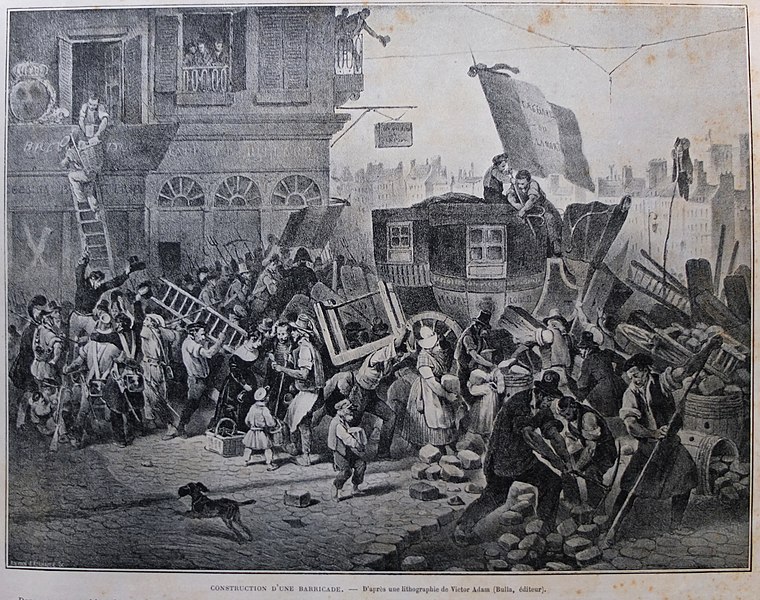
Construction of a barricade in Paris in July 1830 by Wikimedia Commons
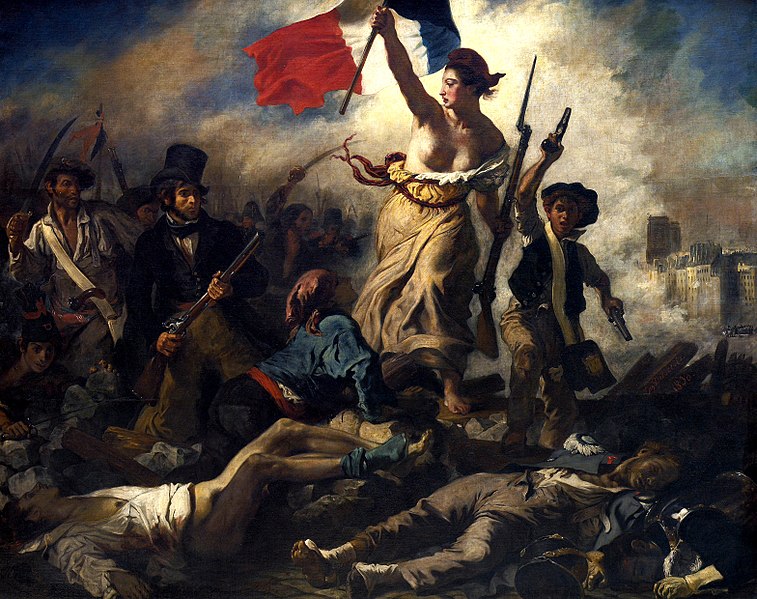
Freedom guiding the people during the revolution of 1830 by Eugène Delacroix

Revolution of 1830 that chased Charles X from the throne by Wikimedia Commons
Victims
The numbers of victims have been debated. The July Column raised place of the Bastille above a necropolis with the body of those fallen during the revolution list the names of 504 individuals who were killed, but it is generally admitted that this has been underestimated and would be around 1,000. The deaths on the Bourbons side have not been estimated. In August 1830, the Chamber voted to pay indemnities to 3,850 injured people, 500 widows and 500 orphans. Final estimations are 163 dead and 578 injured for the Bourbon side, 788 dead and 4,500 injured for the insurgents.
To the glory of the French citizens who armed themselves and fought for the defence of public liberties in the memorable days of 27, 28 and 29 July 1830.
— Text on the July Column
Consequences:
Despite having received the concession of the Charles X, the 30th July the National Assembly and the Assembly of lords and ladies gathered to vote their decision to depose the king and their approval of a new royal election. That decision taken and announced through the city, the real debate were able to start.
Still, the Parisian were difficult to contain during all that time, and everyone knew they had to be fast.
Receiving news of those events, finally fully cornered and forced to remember the revolution of 1789 and the execution of his brother and his family, Charles X abdicated on the 31st of July in favour of his son, Louis XIX, before forcing him to abdicate in favour of Henri V Duke of Bordeaux aged 9, grandson of Charles X through his second son. Louis-Philippe was named regent, in the hope that his liberal reputation would be enough to satisfy the Parisians.
You'd think the guillotine would be rather fresh in his memory and something he'd want to avoid, wouldn't you? But that would be overestimating the intelligence of those Bourbons and the effect of inbreeding!
However, both Assemblies were already in full meeting and control of the situation by then, and they were not ready to give up that power finally returned to them. similarly, if the French people had done a revolution against Charles X, it was not just to listen to him now and so his wishes were completely ignored by everyone, including his cousin Louis-Philippe. Instead, everyone considered that a royal election was the only natural and logical solution in these circumstances, as written in the constitution before the English felt the need to mess up with it.

Henri, Duke of Bordeaux, inspecting the Garde Royale in 1830 by PHGCOM on Wikimedia Commons
The candidates
As soon as the revolt was finished, the Assembly of Lords and Ladies gathered to elect the new King of France. Several possibilities were raised:
- Henri, Duke of Bordeaux. He was of the "legitimate" line, but his young age would leave the control of the government to his family.
- Louis-Philippe for the Orléans branch. He was still a member of the royal family, but he had proven his liberal tendencies, and so his choice would be the perfect compromise between the different political factions.
- François Bonaparte, Napoléon's son and heir. He was a choice extremely popular with French people who loved Napoléon only slightly less than they love his legend. However, his son was raised in Austria and there was no knowing how he had been educated and what ideas had been put in his head.
- Gilbert du Motier, Marquis de Lafayette. He was a hero of the French revolution and the American wars, also popular. However, he was the main choice of the republicans and he was considered to be perfectly capable of sacrificing the monarchy to create a republic just so that he could glorify himself as the saviour of France. A republic is, of course, the most horrifying prospect for everyone who is not a republican. In addition, Lafayette ordered the National guard to fire on the Parisian crowd during the Champ de Mars massacre in 1791, and so not everyone was very enthusiastic about him...
- Lucien Esselin, another extremely popular candidate. He was presented as "Napoléon's true heir" as he was a general in the French army who had highly distinguished himself. He had the benefit of being well known in Paris and through France, not being under the influence of any foreign country and not having any disagreeable family connection.
The debate
The debates in the Assembly were not public, but by all accounts they were fierce. Among the most important voice were all the Napoléonic nobles who had been ennobled by King Napoléon and thought back on their glorious days with nostalgy. Those people did not managed to get where they were by being pusillanimous and they made their wishes for Napoléon II has a king loudly known. Yet, for all of their noise, they were not the majority. The fact that the Austrian ambassador awkwardly attempted to communicate with some of the lords and ladies did not help the young Bonaparte's case. Thus, Louis-Philippe's victory appeared certain. Adolphe Thiers was the most fervent partisans of Louis-Philippe and a very prominent journalist and would-be politician. Charles-Maurice de Talleyrand-Périgord, undoubtedly the most influential politician of his time and the maker and unmaker of all the kings since the revolution of 1789, was even a friend of Louis-Philippe. He has also always wished for an alliance between France and England, and Louis-Philippe was the favourite candidate of the English.I am so obviously the best choice even if it would not do to proclaim it too overtly... Modesty and restraint are the key to victory.
And yet, Louis-Philippe stayed discreet during this time, certain of his victory but not wanting to appear arrogant. He wanted to make himself desired. To be called to reign over France and to pretend that he was reluctant but was making the sacrifice for the good of the country. This all turned against him spectacularly when Talleyrand chose to support Lucien Esselin and so all was decided.
What is this betrayal? Pretending to be my friends for so many years—decades even! Agreeing with all my thoughts and ideas, only to join cause with this parvenu at the last minute! Such treachery will not be forgotten...
Talleyrand
In the end, everyone chose to follow Talleyrand's opinion. As respected a she is despised by French society, the previous Bishop of Autun is infamous for having held position of power through all the regimes that have succeeded each other since the revolution. More than anyone else, he is the most important figure of the half century that has followed the revolution of 1789. The king maker. A nickname almost just as famous as his other one, le diable boiteux. So what made Talleyrand choose Lucien against his own ideals of a making a peace between France and England that would allow both of our country to prosper hand in hand? Louis-Philippe, for all friend that he was, took him for guaranteed. Too preoccupied he was with wanted to appear innocents and loyal during his cousins' reign, he completely avoided Talleyrand's presence so as to avoid the appearance of scheme itself. Lucien did all the contrary. As a young and ambitious general newly affected to Paris, he went everywhere, was at every parties and met everyone. Talleyrand himself was never above enjoying an intelligent conversation partner, and it took little time for the two men to sympathise. And in their milieu, there is little more natural than a political conversation. They exchanged their views and debated ideas and it did not take them long to discover a certain alignments between their ideals.King Lucien, he is a true liberal, not like Louis-Philippe who was born at the top of society with all the advantages that comes with it... That man has always made clear that he thinks himself member of a race superior to the rest of us...
And yet, he also learnt from Napoléon's mistakes, his recklessness and authoritarianism that caused his defeats. Lucien's conviction were strong enough that over the few years that he stayed in Paris he managed to convinced Talleyrand that there would be no risk of a repeat or of seeing a new tyrant on the throne. That he would no slide into the excesses of any of his predecessors.
Lucien is even all for an alliance with the English—provided that such a thing is done on French terms rather than being dictated by some haughty and delusional members of the British Parliament. As the only guarantee for a durable peace is a treaty that both sides can accept and not something that will build up resentment into the population until the least slight will be cause for a new war.
François Bonaparte by Wikimedia Common
La Fayette by Wikimedia Commons
Adolphe Thiers by Bibliothèque National de France - Gallica on Wikimedia Commons
The banker Jacques Laffitte, deputy leader of the opposition by Wikimedia Commons
Charles-Maurice de Talleyrand-Périgord by Wikimedia Commons
King Lucien by AmélieIS, Guérin and Artbreeder
Aftermath
Wars
King Lucien's election was welcomed by cautious manifestation of joy through the country, his reputation being well known by everyone, but by now French people knew better than to expect immediate peace and prosperity. And how right they were.
England was completely blindsided by the swiftness of the events of the July revolution and the rapidity at which the new king was elected rather than the tergiversation of 1815 where even with a sword at its throat it took France a month before capitulating to reality and voting for Louis XVIII. Queen Victoria and her parliament did not even had time to discuss the matter, let alone made their wishes known to their ambassador—not that that gentleman was consulted by anyone other than Adolphe Thiers, as fact that did not endear him with the Assembly...
They immediately started acts of provocation along the French border and had little difficulties into provoking the new king into declaring war against them. This gave them the occasion to act like the personnification of wounded innocence and to call with great cries for the formation of a new coalition against France. The 8th.
The coalition included the same old enemies: England, Prussia, Austria and the Austrian Netherlands, Baden, Bavaria, Nassau, Saxony, Württembeg, Brunswick, Spain, Portugal, Sweden, Naples, Sicily, Sardinia, and Russia... Only Switzerland decided against renewing its membership, undoubtedly too familiar with the new king thanks to his long quartering near their border.
In France, the war declaration was published in all newspaper, and despite the people's lassitude at a new war, the idea of all of those foreigners once again interfering with French affaires and pretending to reimpose them the Bourbons again was enough to boil the blood of even the most placid person.
Thankfully, we are not completely alone against the rest of Europe! Thankfully, France was not completely alone against the rest of Europe. Our old allies of Scotland and Poland are always happy to come to our help and stab their neighbours while they have their back turned!
The actions of Scotland and Poland and a wave of revolutions that distracted the European monarchs allowed our new king the time to lead a lightning campaign against Austria, the Germanic states and the Netherlands. The defeat came so fast that all the other country froze, terrified of seeing the ghost of Napoléon come back to life under their very eyes.
In less than a year, a new peace treaty was signed, with Austria surrendering the Southern Austrian Netherlands—ou old Lys department under Napoléon!—back to France and agreeing to pay some reparations. The English, of course, did not agree to anything even though they were not able to divert their attention away from Scotland.
King Lucien came away from those events with his reputation reinforced and his position on the throne secure, everything the English had wanted to avoid. Since then, new wars have broken out intermittently, every time Lucien showing his brillance as a general and defeating the European coalitions. Still, land gain have been minimal for France, all treaties ending with important reparations being paid to us in exchange for the enemies recovering their borders. This is making many in France mutter angrily.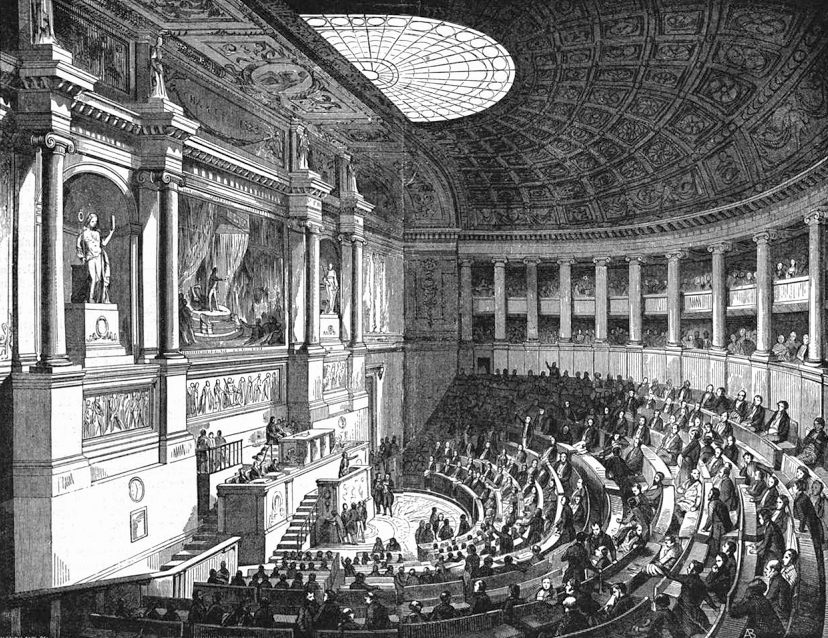
King Lucien with the French parliament by Wikimedia Commons
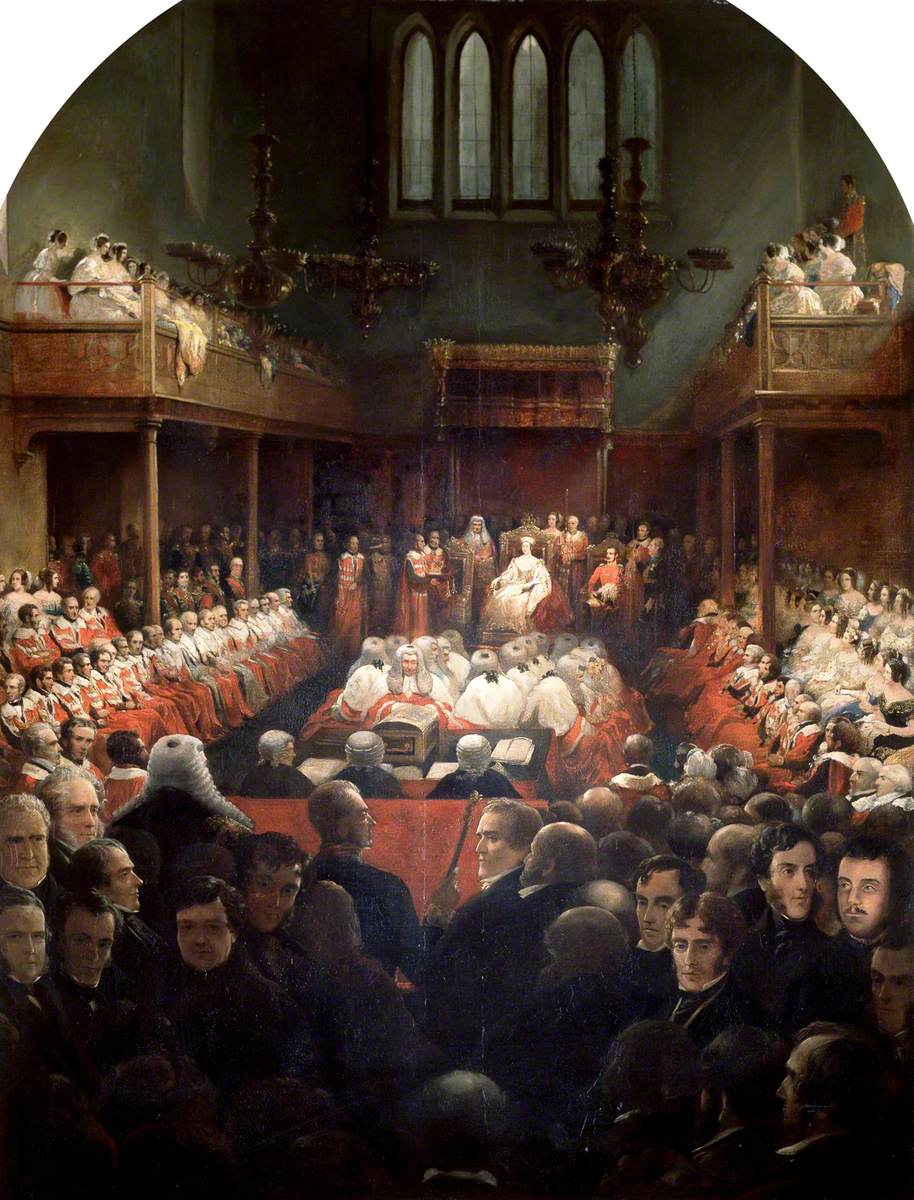
Queen Victoria opening the English parliament by UK Parliament
I'm sure this is the actions of Talleyrand and of whatever deal the king had to make with him to get elected... What does it matter if we conquered too much lands and frighten Europe until they all ally against us if they are going to do so anyway? We might as well rebuilt our empire and get something out of the deal!
Political instability
After Lucien's election, all the Bourbons left the country and went in exile in England. The Orléans and Louis-Philippe followed the same route, pretending to act for the stability of the country, although there is little doubt that they are plotting some nefarious schemes as Orléans always do. François Bonaparte, the potential Napoléon II made a sudden and shocking re-apparition, finally escaping from the shadow of his grandfather the Austrian Emperor to claim his independence in a brillant show of strength by the conquest of his rightfully owned Duchy of Parma. The Bonapartes and their partisans have since then all gathered around him , slowly chewing their way through the rest of Italy while leering at France. One of them Charles Louis Napoléon Bonaparte, Napoléon's nephew, even adapted a pitiful coup d'état in Strasbourg in 1840 that was easily defeated. Still, he has managed to escape and his now hiding in Switzerland, that country now pretending to be neutral and above the petty conflicts of Europe. Yet we all know how it joined the coalition of 1815 and we will certainly not let our eyes drift away from them... Meanwhile, the republicans are still all other France, members of secret societies and plotting their own revolution.Almost captured during the failed uprising in Lyon by Wikimedia Commons
All of those traitors are perfectly willing to work with the enemies of France and betray us all just for their personal glory and the hope they dangle in front of them of one day sitting on the throne!
European revolution
Despite the war the countries of Europe had declared to France in 1830, many were not able to join because of their own revolutionary troubles. Indeed, inspired by the uprising of the French people, many through Europe also rose up against the oppression of their monarchs and conquerors.
Charles Rogier, a Dutch politicians from the South Flanders was even able to gather over Flemish people around him to betray the Austrian and join with France during the war. Other revolution occurred in the pitiful rests of Poland against their Russian conquerors and are repressed in the blood, losing their parliament along the way. In Brunswick, the reigning duke was chased from the throne and replaced by his brother. In Hanovre, students imposed a constitution on their monarch. Other revolts in the German states such as in Prussia have no concrete results beyond bloody repressions.
In Italy, independence movements and against the power of the pope burst out, involving Charles Louis Napoléon Bonaparte and his elder brother who died in the conflict. Those movements will find their paroxysm when Napoléon's son will start his conquests there.
And in France itself, the canuts, silk workers of Lyon, were inspired by the revolution to ask for more rights in 1834. Their demands were met with the fire of the army sent by the government while the king was away at war. They remade the attempt in 1834 with similar results. Still, they are preparing to make a direct plea for the king soon to prevent him from ignoring them and letting the government bear the responsibility of the events.
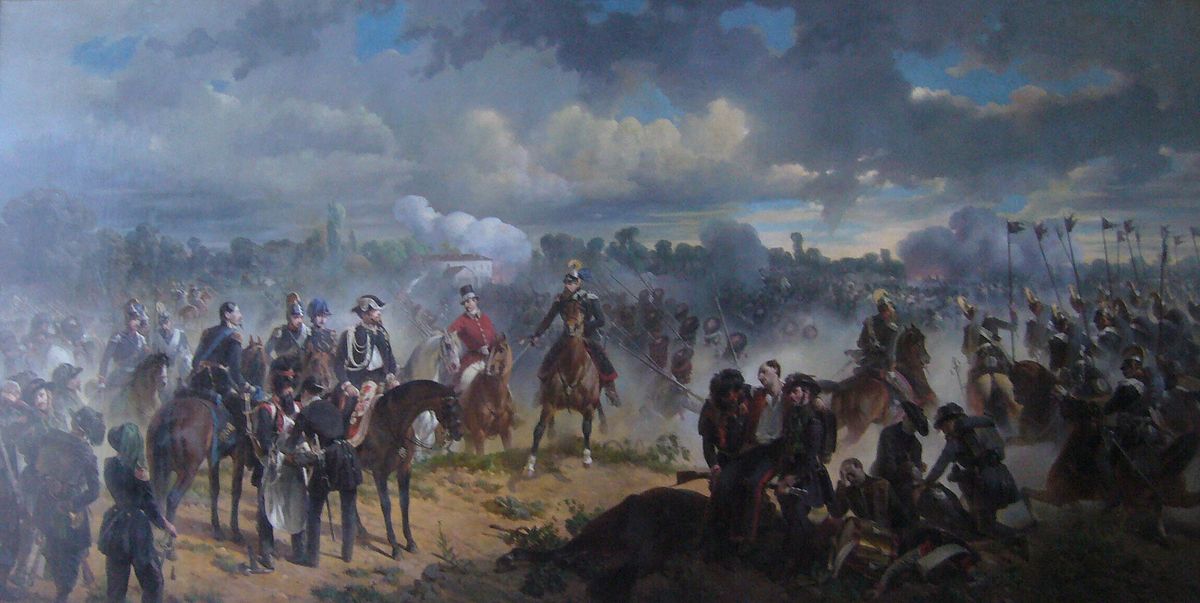
Battle of Goito that saw François Bonaparte extend the Duchy of Parma to the East by Wikimedia Commons
Canuts revolt in Lyon in 1834 by Wikimedia Commons

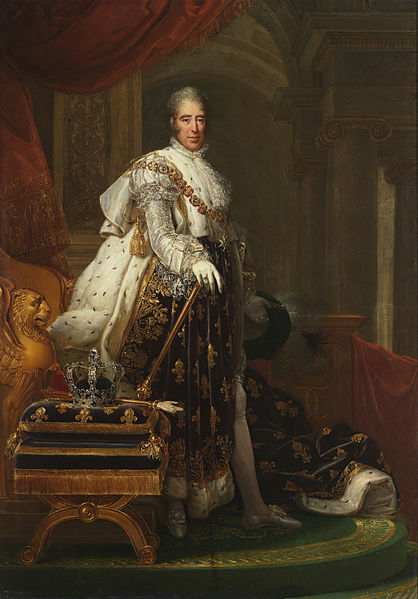
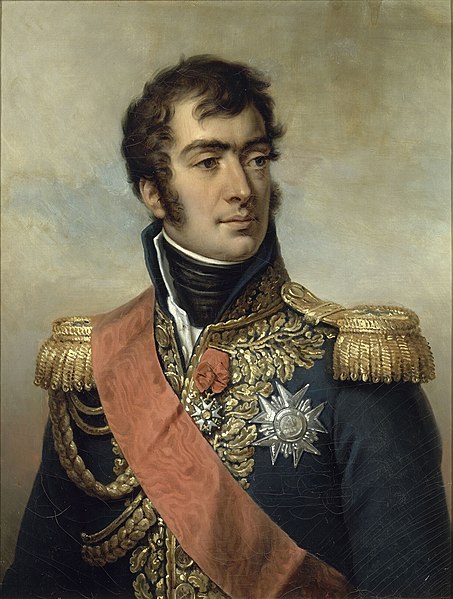
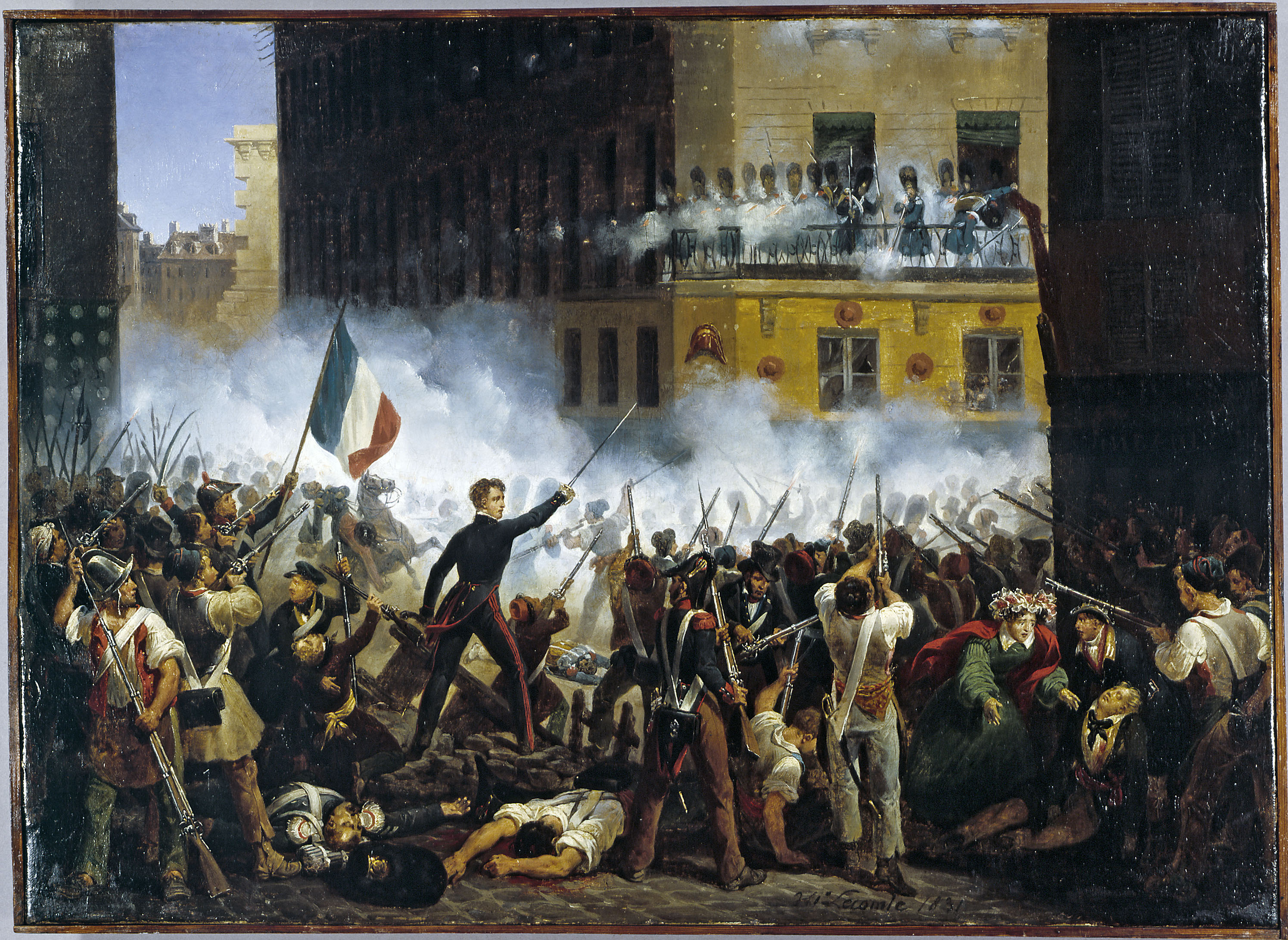

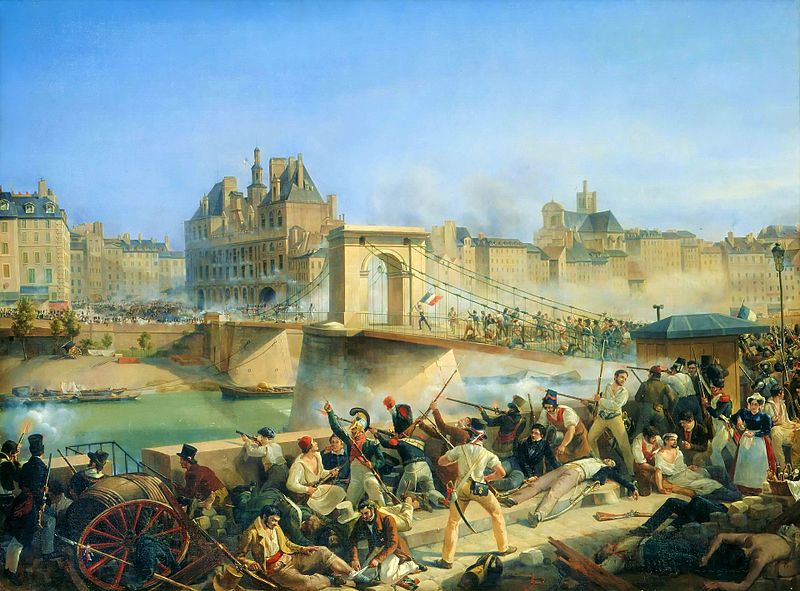
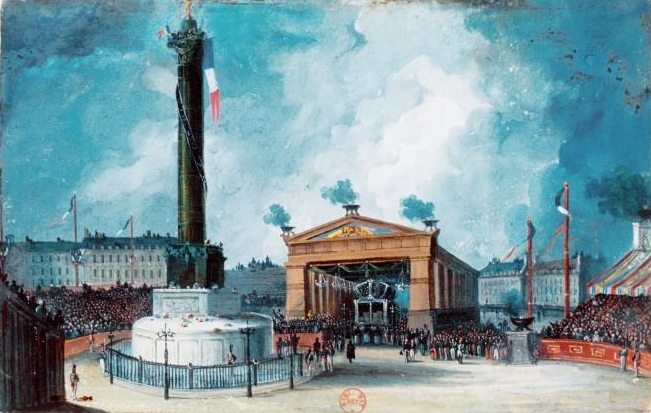
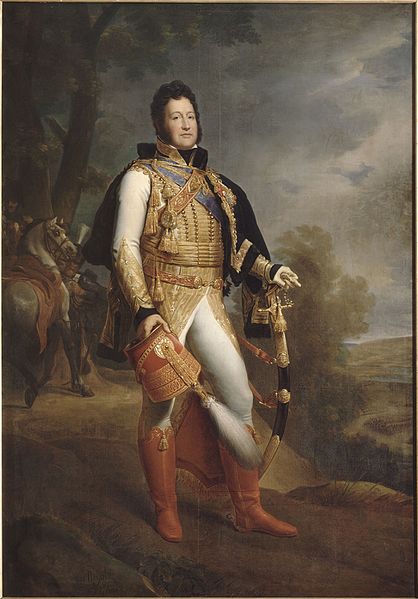

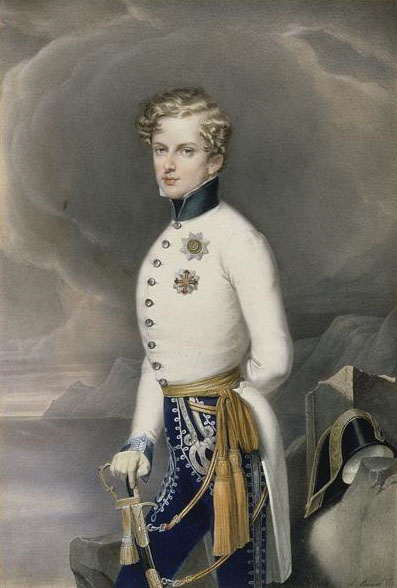
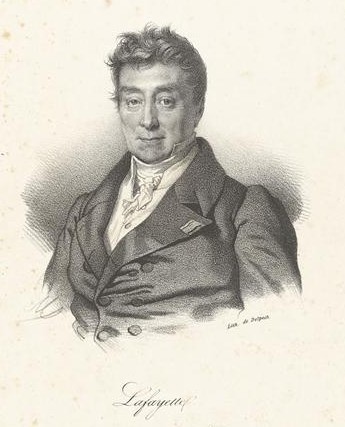
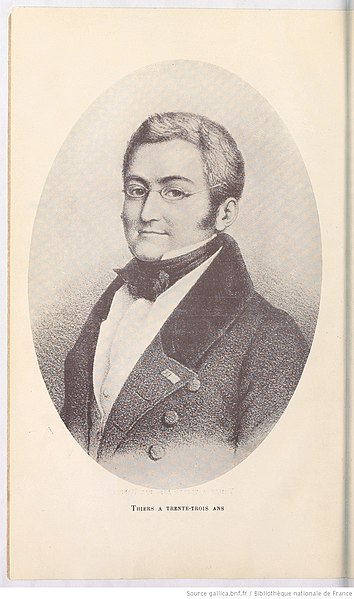
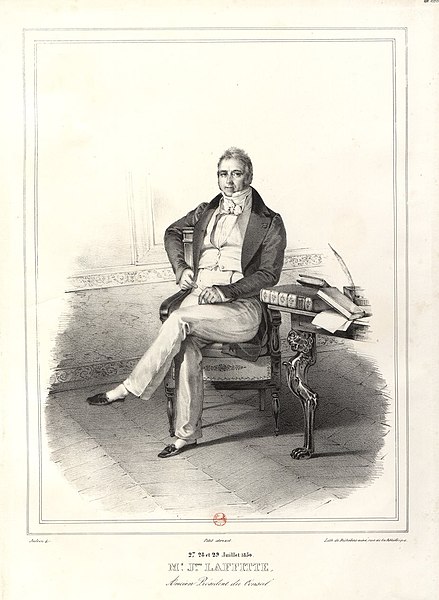
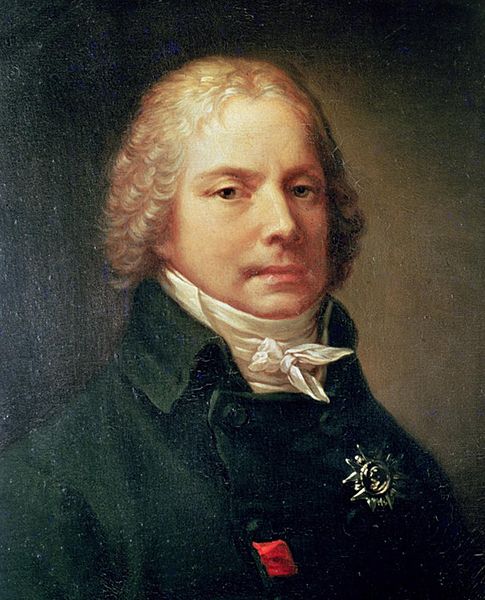

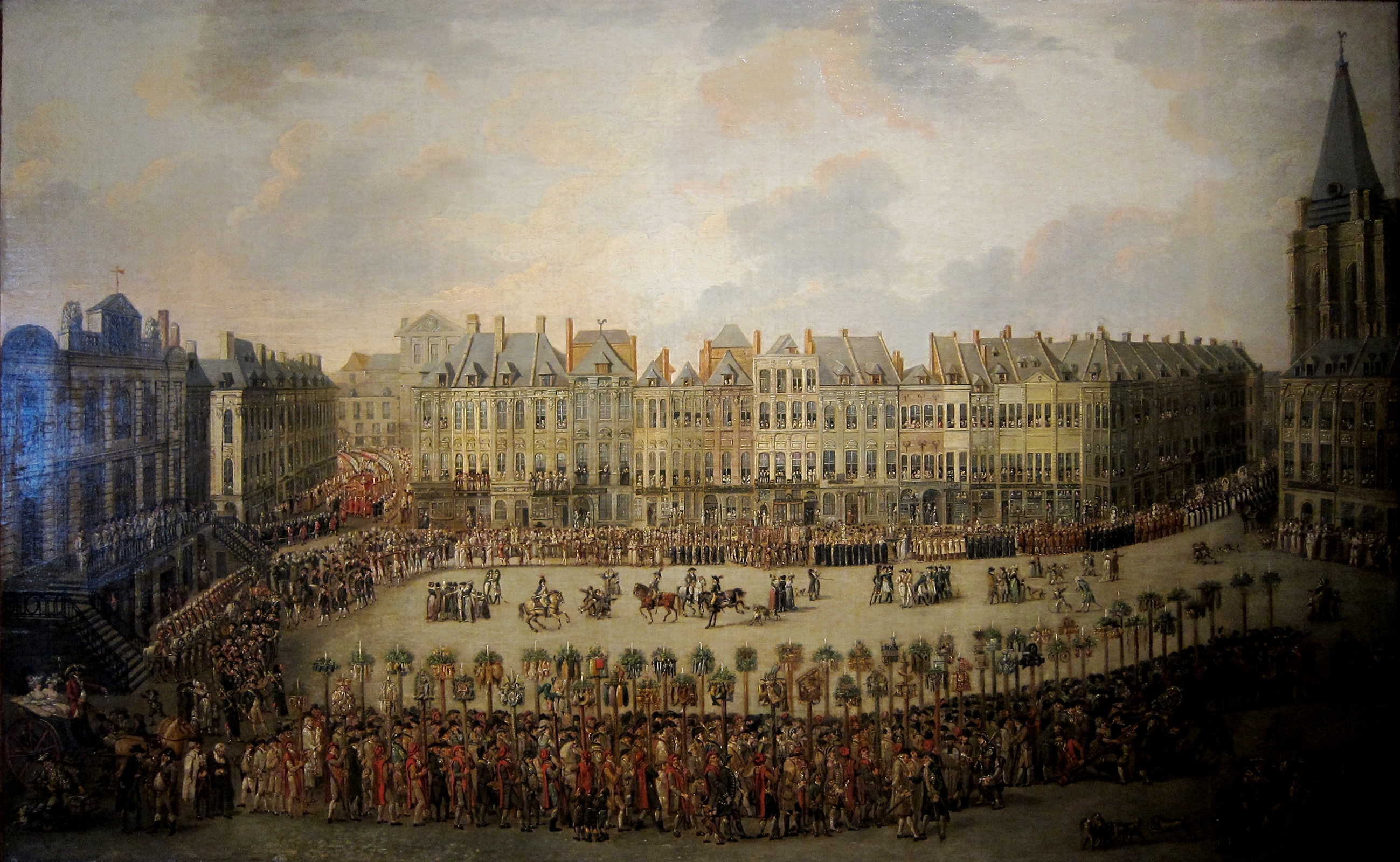
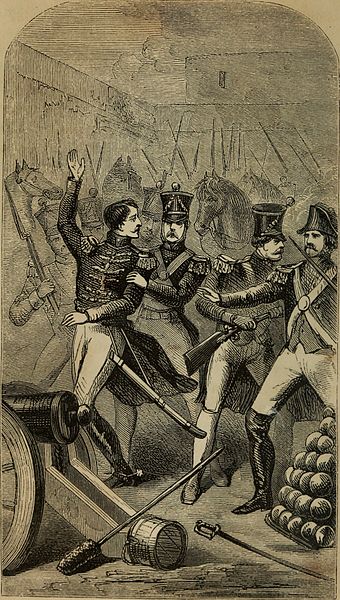
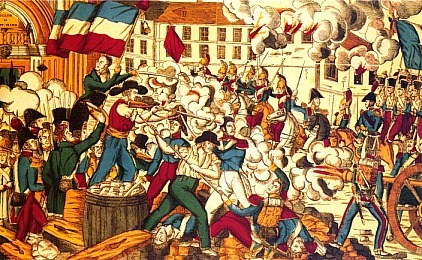

Holy wowzers Amelie! Mind...blown Thank you for submitting on my special category! I really hope you enjoyed taking part in SummerCamp this year! Have a wonderful day and I hope we see you on the awards ceremony!
World Anvil Founder & Chief Grease Monkey
Twitter | World Anvil Changelog
“No act of kindness, no matter how small, is ever wasted.” - Aesop
Thanks :D Summer Camp was amazing :D And sorry for making you read something so long :(